Related Research Articles
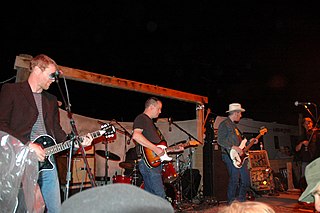
Camper Van Beethoven is an American rock band formed in Redlands, California in 1983, later based in Santa Cruz and San Francisco. Their style mixes elements of pop, ska, punk, folk, alternative, country, and world music, amongst other genres. The band initially polarized audiences within the hardcore punk scene of California's Inland Empire and then found wider acceptance and, eventually, an international audience. Their strong iconoclasm and emphasis on do-it-yourself values proved influential to the burgeoning indie rock movement.
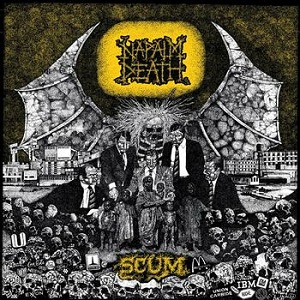
Scum is the debut studio album by English grindcore band Napalm Death, released on 1 July 1987 by Earache Records. The two sides of the record were recorded by two different lineups in sessions separated by about a year; the only musician in both incarnations was drummer Mick Harris. The two sides are very different, and the two taken together serve to bridge stylistic elements of heavy metal and punk rock. While the songs on the A-side are influenced heavily by hardcore punk and anarcho-punk, the vocals and lower-tuned electric guitars on the B-side anticipate subsequent developments in extreme metal. Loudwire put it in the list of the best 10 metal albums of 1987.

Killing Joke are an English rock band from Notting Hill, London, England, formed in 1979 by Jaz Coleman, Paul Ferguson (drums), Geordie Walker (guitar) and Youth (bass).
Popular music of the United Kingdom in the 1970s built upon the new forms of music developed from blues rock towards the end of the 1960s, including folk rock and psychedelic rock. Several important and influential subgenres were created in Britain in this period, by pursuing the limitations of rock music, including British folk rock and glam rock, a process that reached its apogee in the development of progressive rock and one of the most enduring subgenres in heavy metal music. Britain also began to be increasingly influenced by third world music, including Jamaican and Indian music, resulting in new music scenes and subgenres. In the middle years of the decade the influence of the pub rock and American punk rock movements led to the British intensification of punk, which swept away much of the existing landscape of popular music, replacing it with much more diverse new wave and post punk bands who mixed different forms of music and influences to dominate rock and pop music into the 1980s.
Necros was an early American hardcore punk band from Maumee, Ohio, although they are usually identified with the Detroit music scene. They were the first band to record for Touch and Go Records.
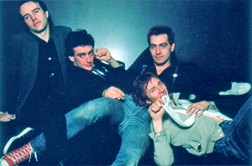
The Ruts are an English reggae-influenced punk rock band, notable for the 1979 UK top 10 hit single "Babylon's Burning", and an earlier single "In a Rut", which was not a hit but was highly regarded and regularly played by BBC Radio 1 disc jockey John Peel. The band's newfound success was cut short by the death of lead singer Malcolm Owen from a heroin overdose in 1980. Despite this the band continued under a different musical style as Ruts D.C. until 1983 when they disbanded, the band later reformed in 2007.
Sweet Savage are a heavy metal band from Belfast, Northern Ireland, formed in 1979. Future Dio and Def Leppard guitarist Vivian Campbell was an early member. Since forming in 1979, Sweet Savage have released three studio albums, three singles and one demo. Their latest album, Regeneration, was released in 2011.

U.K. Subs are an English punk rock band, among the earliest in the first wave of British punk. Formed in 1976, the mainstay of the band has been vocalist Charlie Harper, originally a singer in Britain's R&B scene. They were also one of the first hardcore punk bands.
The Nips are an English punk rock band formed in London in 1976 as the Nipple Erectors by punk artist Shanne Bradley. They were Shane MacGowan's first musical group.
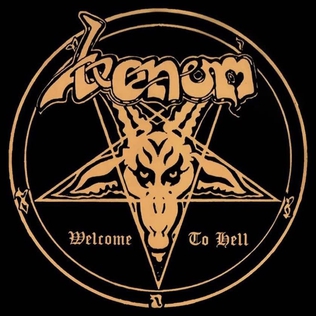
Welcome to Hell is the debut studio album by English heavy metal band Venom. It was released in December 1981 through Neat Records at the culmination of the new wave of British heavy metal movement. The album was re-released by Sanctuary Records in 2002.
Folk Devils were an English 1980s post-punk ensemble born of the Notting Hill, West London music scene.

Yachts were a British power pop/new wave band, best remembered for their 1977 single "Suffice to Say" and the minor new wave classic "Love You, Love You".
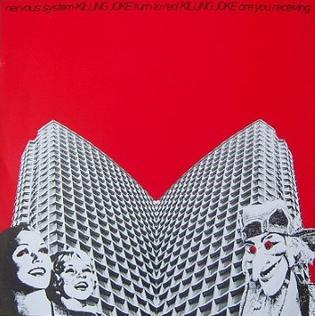
Turn to Red is an EP and the debut release by English post-punk band Killing Joke. It was released as a 7-inch EP on 26 October 1979 by Malicious Damage and re-released as a 12-inch EP on 14 December by Island Records.

"Change" is a song by English post-punk band Killing Joke that appeared on the US release of their 1980 self-titled debut album. The song bears a resemblance to the War song "Me and Baby Brother", which Killing Joke have acknowledged.
The Wall were a punk rock band formed in Sunderland, England, in early 1978. They have released two studio albums.
Icon A.D. were an English anarcho-punk band formed in Leeds in 1979. They were included on Crass' 1980 compilation album Bullshit Detector and in 1982 recorded a Peel session for BBC Radio 1. Their debut EP Don't Feed Us Shit reach number twenty on the UK Independent chart. Steve Lamacq cited their second EP Let The Vultures Fly... as one his favourite U.K. punk records of all time.
Ian Lowery was an English vocalist and poet who fronted several bands, including The Wall, Ski Patrol, Folk Devils, and King Blank, as well as recording as a solo artist.
References
- 1 2 Lazell, Barry (1997) Indie Hits 1980–1989, Cherry Red Books, ISBN 0-9517206-9-4, p. 207
- 1 2 3 4 5 6 Thompson, Dave (2014) "Here Comes the Ski Patrol!", Goldmine , 2 April 2014. Retrieved 24 January 2021
- ↑ Glasper, Ian (2004) Burning Britain: The History of UK Punk 1980–1984, Cherry Red Books, ISBN 978-1-901447-24-8, pp. 255-257
- ↑ Gimarc, George (2005) Punk Diary: The Ultimate Trainspotter's Guide to Underground Rock 1970–1982, Backbeat Books, ISBN 0-87930-848-6, p. 291
- ↑ Ian Lowery Interview", No Class, Issue 1, 1981. Retrieved 24 January 2021
- 1 2 3 4 5 Strong, Martin C. (2003) The Great Indie Discography, Canongate, ISBN 1-84195-335-0, p. 404
- 1 2 3 Peacock, Tim (2014) "Versions Of A Life (Recordings 1979-81) | Ski Patrol", Record Collector , Issue 431, 2 August 2014. Retrieved 24 January 2021
- 1 2 Garner, Ken (1993) In Session Tonight, BBC Books, ISBN 0-563-36452-1, p. 294
- ↑ "BBC - Radio 1 - Keeping It Peel - 19/01/1981 Ski Patrol". BBC. Retrieved 14 August 2013.